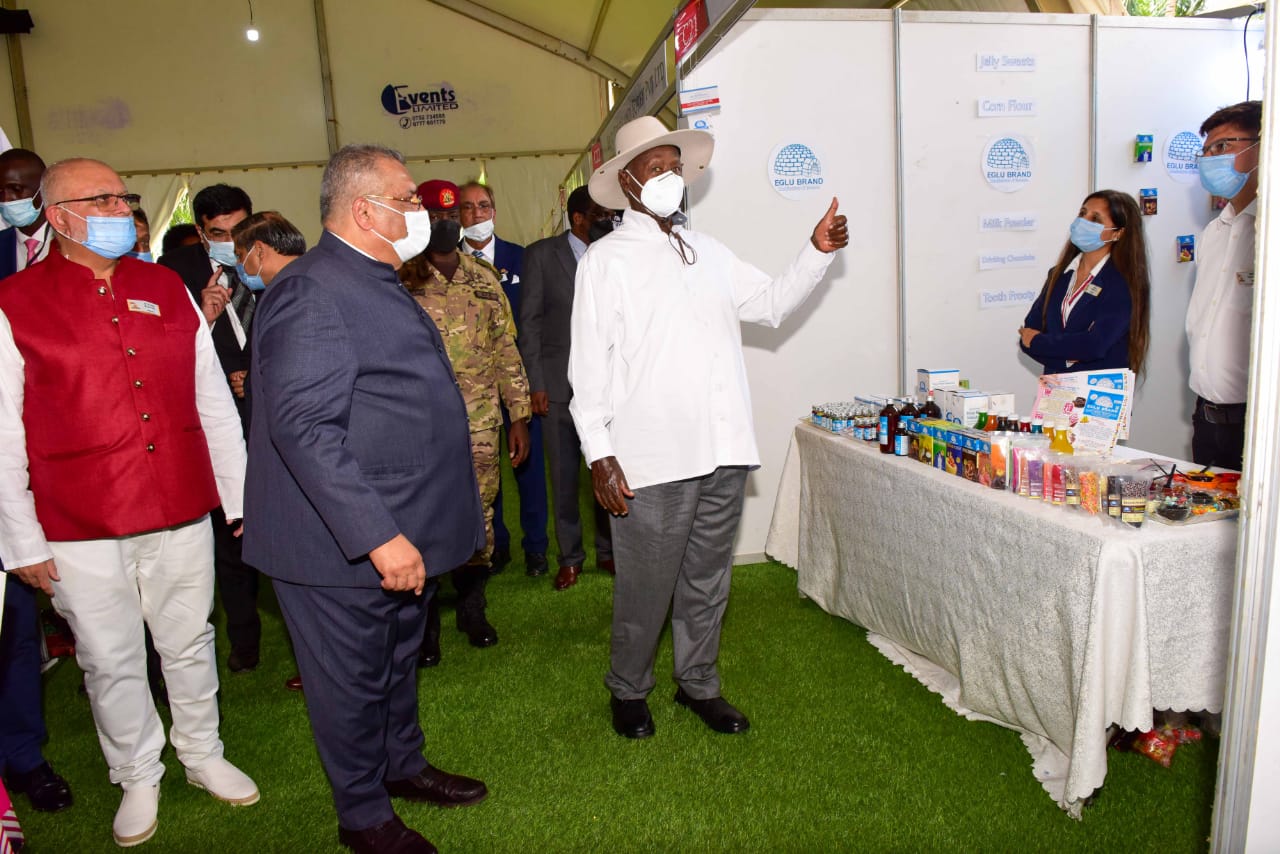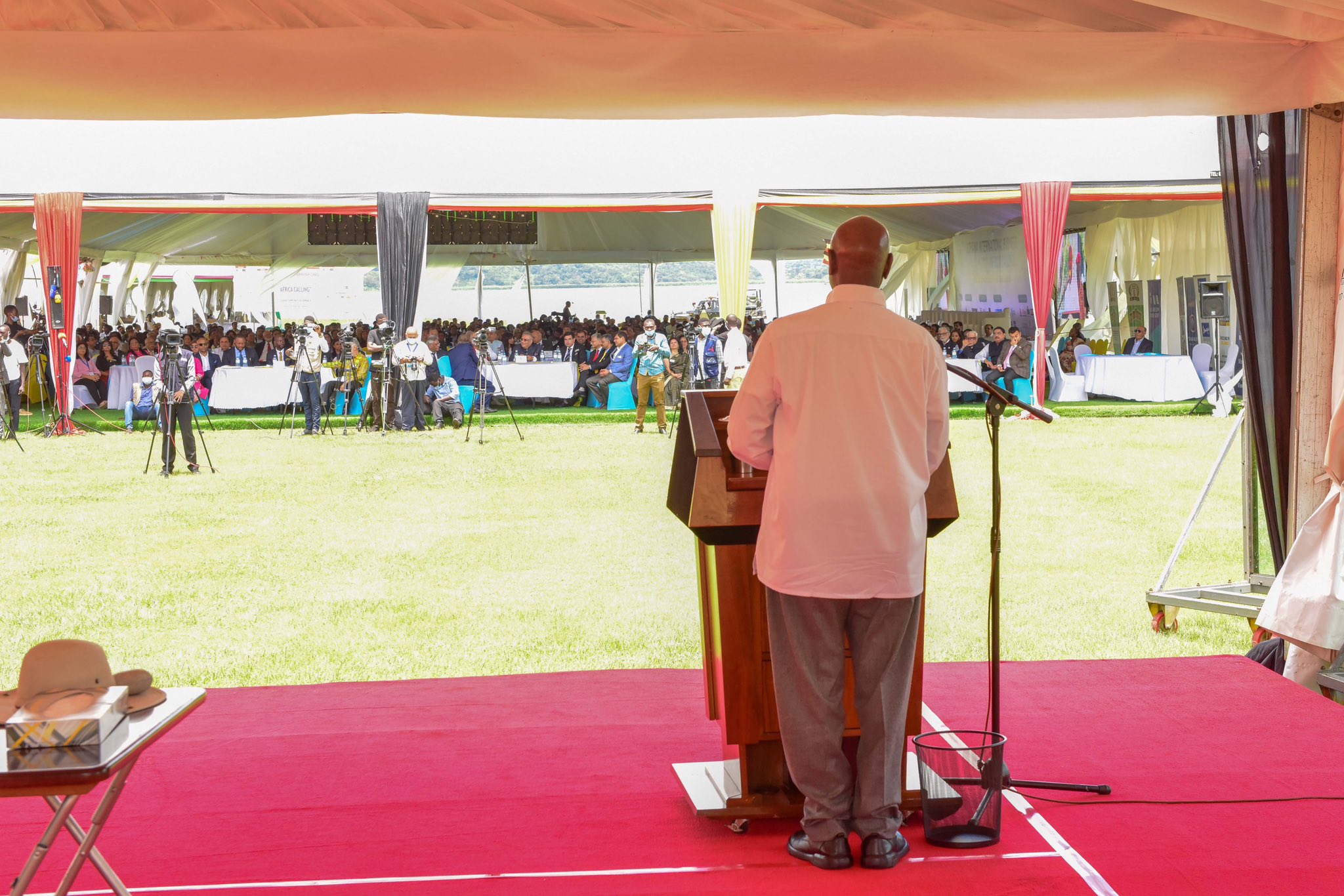Prime
Museveni tips investors on 7 clusters of value addition

President Museveni inspects a stall as he interracts with businessmen and investors durirng Lohana International Business Forum (LIBF) at Munyonyo in Kampala. PHOTO/PPU
What you need to know:
- The President says value addition is the way to ensuring development in the country.
- The Lohana International Business Forum dubbed “Africa Calling” attracted more than 750 business elite and investors from 139 cities, representing 22 countries and from 29 businesses and services sectors from the influential global Lohana Indian community
President Museveni has called upon investors to ensure value-addition to Uganda’s raw materials in order to make it to a first world economy.
“This economy can quickly become a first world economy. It is now entering the middle-income level, but it can easily go faster, why? Because the raw material base is already big,” Mr Museveni said, mentioning coffee, which is fetching Uganda $900 million (about Shs3.4 trillion).
He added that Uganda is also doing well on steel production.
“For a long time, we didn’t have investors in steel but now they’re rushing to develop a steel industry inside the African continent so that we don’t have to get steel from China, Ukraine or India,” he added.
While addressing the Lohana International Business Forum (LIBF) at Munyonyo in Kampala, the President highlighted seven key clusters of raw material base in Uganda ready for value addition on Wednesday.
These include Agro-processing (fruits…oil seeds, agricultural products), minerals (iron ore, steel, copper, phosphates, cobalt, gold, Nicol, lithium and niobium), fresh water resources to facilitate fish farming, forest products (furniture, ceiling boards, paper industry), knowledge sector like the automobile industry, services sector and pathogenic economy.
“These human diseases are a problem but also a very big opportunity. Our scientists here discovered one substance called Covidex which cured many people of corona. Uganda only lost 1,600 people to Corona,” he added.
About the automobile industry, the President said Uganda is on the right track when it comes to production of motor vehicles and would soon stop importing from Japan and other countries.
“We have designed our own buses and electric cars. I don’t want to hear about assembling, that one I will not accept. We must manufacture and fabricate here not assembling,” the President said, adding that part of the problem of Africa has been confining ourselves to producing raw materials and not adding value.
He gave an example of coffee whose global business in the world is $460 billion but the coffee producing countries only share $26 billion.
“When we produce and sell a kilo of coffee beans, we get $2.5 per kilo. But when somebody roasts and packages that same amount of coffee, gets $25 from our product and all the jobs are exported,” Mr Museveni said.
He added that the same applies to textiles, which has about seven levels of activities during production namely: spinning, weaving, printing colours, tailoring, among others.
He said the struggle of NRM to wake up Ugandans to stop working only for consumption is progressing well.
“Africa is big but fragmented politically, that’s why we revived the East African Community. We now have a ready market of 300 million people. Recently, we were in Algeria, and they say Ugandan milk is the best and much better than they were getting from Ukraine and Russia and they’re ready to take Ugandan powdered milk that’s what they like most,” the President added.
He welcomed the Lohana businessmen to Uganda, saying the Asian people played a positive role in boosting Uganda’s trade.
The Global chairperson of Lohana International Business Forum, Mahaparishad Satish Vithalani, and the chairperson board of trustees of Lohana community in Uganda, Sudhir Ruparelia, told the President that his good leadership and policies offer stability, security and confidence for long term development.
The Minister for Finance and Economic Development-in-charge of investment, Ms Evelyn Anite, said Uganda now boasts of more than 1,900 factories owned by Indians and 900 by the Chinese.
She informed the President that they have interested the Lohana Business Community to invest in various virgin ventures, including pharmaceuticals and edible oil.
The President also flagged off 50,000 uniforms manufactured in Uganda to be exported to the Republic of Equatorial Guinea.
Business investors
The Lohana International Business Forum dubbed “Africa Calling” attracted more than 750 business elite and investors from 139 cities, representing 22 countries and from 29 businesses and services sectors from the influential global Lohana Indian community.
Some of the countries represented were; India, Kenya, UK, Tanzania, United Arab Emirates UAE, USA, DRC, Canada, Portugal, Oman, Angola, Mozambique, South Sudan, Germany, South Africa, Madagascar and Uganda.
The forum showcased opportunities for business and investment in Uganda and provided a platform for Lohana delegates to promote their companies to the Ugandan business community.
In Uganda, the Lohana Community form one of the strongest investment and business blocs and includes luminaries such as Ruparelia Group (real estate and hospitality), Madhvani and Mehta (sugar) and House of Dawda (processed foods), among others.




